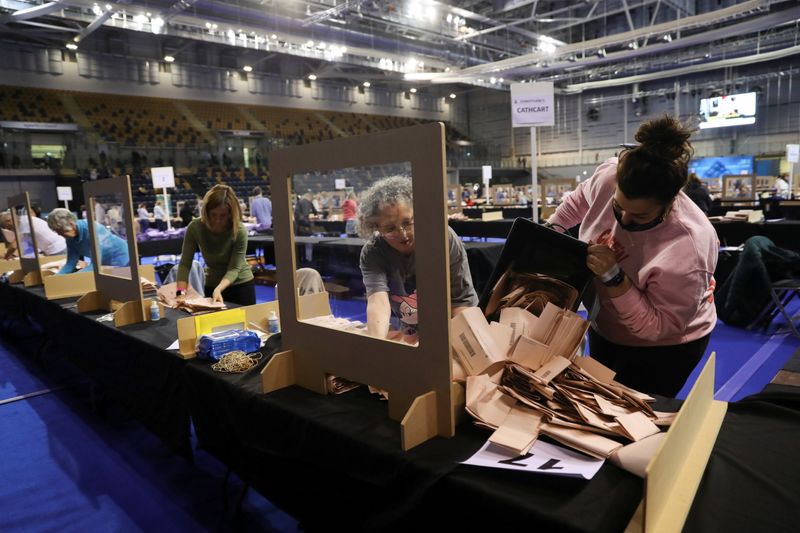By Michael Holden
LONDON (Reuters) - Scottish nationalists are set to push for a second independence referendum with pro-independence parties holding a majority in the Scottish parliament, although British Prime Minister Boris Johnson has said he would block any such vote.
In a referendum in 2014, Scots voted 55%-45% to remain in the United Kingdom, but both Brexit and the British government's handling of the COVID-19 crisis have bolstered support for independence among Scots, and demands for a second vote.
ELECTION RESULT
The ruling nationalist Scottish National Party said it would seek to hold a referendum if pro-independence parties won a majority in elections this week for a Scottish Parliament.
Results on Saturday showed the SNP and the Scottish Greens, who also support secession, have won more than half of 129 seats in the parliament, enough to ensure a pro-independence majority for any referendum bill to be passed.
Scottish First Minister Sturgeon, who is the SNP leader, has said she would not propose an immediate vote while the country recovers from the coronavirus pandemic.
The party has said it intends the vote to be held within the first half of the five-year term, so likely by the end of 2023.
WHAT WOULD A REFERENDUM MEAN?
If Scots voted to leave, it would be the biggest shock to the UK since Irish independence a century ago - just as all of the UK grapples with the COVID-19 crisis and the impact of Brexit, a move that Scotland's voters strongly opposed.
The nations of Britain have shared the same monarch since 1603, when King James VI of Scotland became James I of England. In 1707, a formal union created the Kingdom of Great Britain.
Today, the United Kingdom of Great Britain and Northern Ireland binds England, Scotland, Wales and Northern Ireland into an economy worth $3 trillion a year.
SECTION 30
Under the 1998 Scotland Act - which created the Scottish parliament and devolved some powers from Westminster - all matters relating to the "Union of the Kingdoms of Scotland and England" are reserved to the UK parliament in London.
Westminster can grant the Scottish government the authority to hold a referendum using a so-called "Section 30" order, a process that was used to allow the 2014 plebiscite to go ahead.
In effect, Johnson's government says that gives him the authority on whether or not Scotland gets a referendum. Sturgeon argues he would be blocking the democratically-expressed will of the Scottish people if he refused.
WILL PERMISSION BE GIVEN?
In January 2020, Johnson refused Sturgeon permission to hold another referendum, saying the 2014 vote had been a "once in a generation" event, and he has ruled it out repeatedly since.
The SNP and the Greens say that Johnson would have no moral or democratic grounds to refuse another referendum.
If he does again say "No", the SNP says the Scottish government would push ahead with passing a referendum bill in the Edinburgh parliament, and that Johnson would have to go to court. Sturgeon argues if the Westminster government does not challenge the plans in court, then it would be a legal vote.
COURT BATTLE
Before any Scottish bill is enacted, it can be referred to the Supreme Court, the UK's highest judicial body, to decide whether it exceeds the Scottish parliament's powers under the Scotland Act.
It is almost certain that a referendum bill, if passed without explicit permission and with the opposition of the British government, would be referred.
Judge David Hope, former deputy president of the Supreme Court, said the Scotland Act would be a major constraint on the Scottish government. "They are trapped within a statute which is very carefully drafted," he told Reuters.
Others think it is not so clear-cut. "There are respectable arguments for saying that a referendum bill would be within devolved competence," said Professor Aileen McHarg, an expert on constitutional law at Durham University.
WILDCAT REFERENDUM?
If Johnson and the courts blocked a proposed referendum, some in the SNP say the Scottish government should press ahead regardless, with an indicative vote.

But others in the party and legal experts say that, because the legitimacy of such vote would be questionable, opponents of independence would simply boycott it, and so undermine its credibility.
Sturgeon herself has said she does not want to hold an illegal vote, citing the case of Catalonia which unsuccessfully declared independence from Spain in 2017 after a referendum ruled illegal by judges.